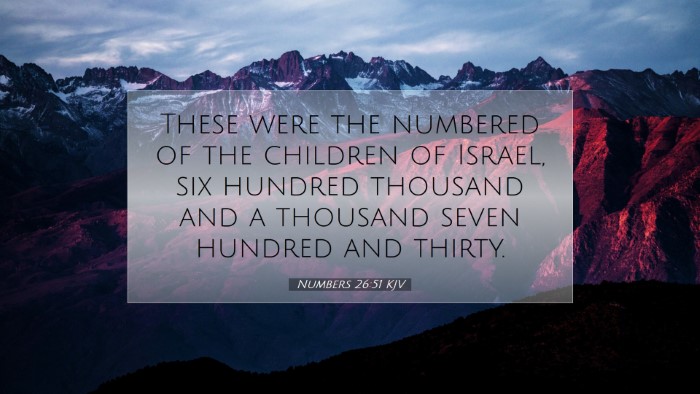Commentary on Numbers 26:51
Bible Verse: "These were the numbered of the children of Israel, six hundred thousand and a thousand seven hundred and thirty." - Numbers 26:51
Introduction
The Book of Numbers details the census conducted among the Israelites as they journeyed through the wilderness toward the Promised Land. Numbers 26:51 presents the conclusion of this second census, illustrating the size and growth of the Israelite community. Understanding this number is crucial for grasping the nature and unfolding narrative of God’s chosen people during this formative period.
Contextual Background
The chapter marks a pivotal moment for the Israelites as they prepare to enter Canaan. Following their exodus from Egypt, the initial census recorded in Numbers 1 provides a baseline population of the twelve tribes. However, due to disobedience and divine judgment, many individuals from that generation had perished during their 40 years in the desert. This second census not only evidences continuity but also the faithfulness of God’s promises even amidst judgment.
Insights from Commentaries
Matthew Henry
Matthew Henry notes that this significant figure of "six hundred thousand and a thousand seven hundred and thirty" demonstrates God's providential care over the Israelites. Despite their trials and tribulations, God preserved a remnant, which highlights His faithfulness. Henry highlights the significance of the present generation, which contrasts sharply with the previous disobedient generation now lost to the wilderness.
Albert Barnes
Albert Barnes emphasizes the implications of such a population. He reflects on the military potential represented by these numbers, as the Israelites would need to be organized and ready for battle upon entering Canaan. Additionally, Barnes illustrates how the growth reflects God’s promise to Abraham regarding the multitude of his descendants. This growth exemplifies a fulfillment of covenant promise, serving both as assurance and responsibility for the Israelites entering the land of promise.
Adam Clarke
Adam Clarke regards the figure as a testament to God's favor, noting how this census illustrates not just quantity but also the quality of the community of faith being forged. Clarke suggests that the numbering indicates a necessary preparation for the future conquest and settlement in Canaan, highlighting the honor and duty of the Israelites to uphold the covenant. Clarke insists on the responsibility that comes with such blessings, urging the people to live in a manner worthy of their calling as God's chosen people.
Theological Implications
This verse conveys several important theological themes:
- Divine Provdence: The preservation and growth of Israel signal God’s active involvement in history, where He orchestrates circumstances for His people’s benefit.
- Covenant Faithfulness: Numbers 26:51 reflects the steadfastness of God’s promises to bless Israel, fulfilling the Abrahamic Covenant in practical terms through the generations.
- Preparation for Mission: The census was not merely informational; it was instrumental in preparing Israel for their specific mission in Canaan, reinforcing the call to holiness and obedience.
Conclusion
In examining Numbers 26:51, one cannot overlook the thematic richness present within a simple numerical statement. For pastors and theologians, this verse serves as a reminder of God’s faithfulness throughout the ages and His enduring purpose for His people. The implications of this passage resonate with a call to recognize our identity as a part of God's people today, urging faithfulness and preparation as we embark on our own journeys. Thus, the number, while historical, also serves as an invitation to act in light of our understanding of God's continued involvement and covenant obligations.


